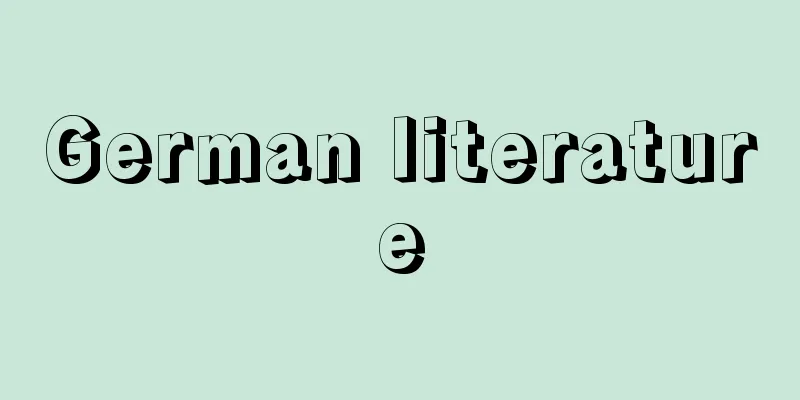German literature

|
German literature means literature written in German. In Germany, Austria, Liechtenstein, and Switzerland, about two-thirds of the population belongs to German-speaking countries. Together, they occupy a considerable area in the small European continent, but due to the collapse of the Austro-Hungarian Empire and the shrinkage of the German state after World War I, and the shrinkage of the German state after World War II, the size has become smaller than in the 19th century. There are other areas around the world where German-speaking people live, but they can be ignored when understanding the long history of German literature. The German Empire only acquired colonies in Africa and Asia at the end of the 19th century, and all of them were removed from German rule after World War I, so there is no German literature in the former colonies. This is a major difference from literature in English, Spanish, French, and Portuguese. Therefore, there is no such thing as pidgin German (pidgin is a language that developed as a common language for communication between different mother tongues). Currently, English vocabulary is penetrating German significantly. As English establishes its position as an international language, attention is focused on what impact European integration will have on the linguistic landscape. German as a standard language is not based on the language of a certain big city. Standard German was built up on the basis of Southern German, known as High German, the common written language of government offices, the language of Luther's Bible translation, the common stage language throughout the country, and especially the efforts of writers and intellectuals over the centuries to purify and improve the language. Therefore, one of the characteristics of German literature is the following phenomenon. The word Land is used in many ways, such as land, territory, country, region, countryside, and state as an administrative unit, but in German literature Land literature is thriving and there are many excellent works even without using dialects. For example, Sudermann, one of the representative writers of the Naturalist era, received great acclaim for his play Honor (1890), which is set in Berlin, which was experiencing rapid economic growth after the Franco-Prussian War, and has one of the characters say that what supports the idea of honor is no longer social status or chivalrous values, but wealth. However, today he is being reevaluated for his novels depicting the scenery of his native East Prussia. Sacher-Masoch, from whom the term masochism originated, was also rediscovered in novels about gentry and Jews in his native Galicia. In Thomas Mann's Budenbrooks (1901), a woman from a prominent family in Lübeck, North Germany, marries a merchant in Munich, and the story is about how they end up getting divorced due to the huge difference in their lifestyles, including the difference in the way of speaking between her and her family, who used strict standard Japanese. Literature plays an important role in expressing hierarchical differences such as rank and status, and horizontal differences such as region and ethnicity. According to Enzensberger, the history of the German-speaking people has gone beyond the usual political power struggles and has undergone many struggles that have affected the very foundations of the cultural unity. In prehistoric times, the Germanic peoples coexisted and competed with the neighboring Celts and Slavs. For example, the etymology of the place name Vienna is a Celtic word related to a river, and going back to a later period, Berlin (founded in the 12th century) is thought to have been a Slavic word for "marsh". Next, there was the division between the territory of the Roman Empire and the territory of the Germanic peoples to the north. The borders of the Roman Empire (bulwarks) called the Limes can still be clearly seen today in aerial photographs. During the Great Migration, fierce wars of conquest took place between Germanic tribes. The long conflict between Protestantism and Catholicism that began with the Protestant Reformation. There was friction between Austria-centered Greater Germanism and Prussia-centered Little Germanism over the realization of a modern nation-state. Then there was the rivalry between East and West Germany after World War II. These circumstances prevented the concentration of cultural centers, including literature, in one place, such as London in the UK or Paris in France. German literature experienced three golden ages during periods when Germany was revitalized by the dynamism of the rivalry between the forces of concentration in the center and the forces of separation due to regionality and division. By the way, the main genres of literature are poetry, novels, and plays, but if we take a somewhat broader scope, it includes essays and critiques with some artistic flavor, travelogues, diaries, letters, autobiographies, critical biographies, academic works for general readers, sermons, life lessons, translations, etc. Goethe left behind works that represent German literature in almost all of these areas, and this also confirms his outstanding presence. [Daisuke Higuchi] The history of German literaturemiddle agesEarly medieval literature was overwhelmingly Christian-based Latin literature, and was written by monks. Among these, the warrior epic poem "Hildebrandlied" (c. 850), written in Old High German, stands out. It uses alliteration, as is common in Germanic epics. The Gospels, written by the monk Otfried von Weissenburg in the mid-9th century, already uses the end-of-line rhyme and quatrain structure that are common in German poetry up until the modern era. Literary activity became more active around 1050, and after the Second Crusade (1147-49), secular literature became more dominant than religious literature. [Daisuke Higuchi] First peak period (1190-1230)The heyday of medieval literature overlaps with that of the Hohenstaufen dynasty. This was the time of Emperors Henry VI (reigned 1190-97) and Frederick II (1212-50). The emperors were on an equal footing with the powerful Papacy. As the successors of the Roman emperors, they believed that they had been granted the right to rule Europe directly from God. Their time was a time of extensive traffic, with the third to fifth Crusades, repeated expeditions by German troops to Italy, two visits to Germany by Frederick II, who was based in Sicily, and the emergence of rival emperors within Germany. The bearers of literature were knights and ministeriales, people who served local lords and used their military strength and intelligence to their advantage. Aware that they were at the center of Europe, they mainly took up subjects that had been introduced from southern and western Europe, which were advanced in literature. These include court love poetry, which came north from Arabic literature in Spain and the Provencal troubadours, and court epics such as the Holy Grail tale, King Arthur and the Knights of the Round Table, and the legend of Tristan, which developed from the seeds of Celtic legends that spanned both France and England. Among these, the influence of the late 12th century French poet Chrétien de Troyes was particularly notable. The main writers of court epics were Hartmann von Aue (Gregory, Poor Henry, Ebene), Wolfram von Eschenbach (Partival, Willehalm, Titurel), and Gottfried von Strassburg (Tristan). Love lyric poetry is called Minnesang (love song) in Germany. The original form of courtly love poetry, which is love for a noble lady, was perfected by Reinmar. However, perhaps because the relationship between noblewomen and knights in Germany was different from that in France, Walter von der Vogelweide sang of "low love", that is, love for a commoner woman, in addition to "high love". This tendency was later strengthened by Neidhardt von Reuenthal. Incidentally, Minnesenger, the author of Minnesang, did not only write poetry, but recited it while strumming an instrument. This can be imagined by looking at the Wartburg Song Contest in the second act of Tannhäuser by the 19th century composer Wagner. Walter's and Neidhardt's compositions have been preserved, although incomplete, and can be heard performed with the revival of early music in the 20th century. A little later, in the first half of the 15th century, the South Tyrolean poet Oswald von Borkenstein created a fresh and refreshing Renaissance style of personal song, and was highly acclaimed not only as a poet but also as a composer. In Germanic literature, the epic poem "The Nibelungenlied" (c. 1205) is outstanding. In the late Middle Ages, while the epic and love poetry that had been popular in the High Period continued, works such as "Helmbrecht," which added sharp observations, and Stricker's "Priest Amis" (c. 1240), which developed into a more raw comedy, also became noteworthy. [Daisuke Higuchi] MysticismMysticism cannot be overlooked as an underlying influence on later literature. It is the teachings of men such as Eckhart (c. 1260-1328), Tauler (c. 1300-1361), and Heinrich Seuse (c. 1295-1366), and women such as Hildegard von Bingen (12th century) and Mechthild von Magdeburg (1207-1282). The experience of God's grace permeating every corner of a person's inner self became the yeast of literature in Goethe's time through Pietism, which holds that an individual can commune with God without an intermediary and without being crushed by the burden of original sin. Furthermore, the dichotomy between the world of phenomena and the world of ideas in Platonism, which is the source of mysticism, and the dichotomy between what belongs to the flesh (the world of the senses) and what belongs to the spirit (mystical union with God) in mysticism, have been passed down to important figures in modern German literature, even as they have moved away from religion. In The Delusions of the Kindergarten Student Telles, Musil (1880-1942) states that the world is dual, in the same way that "there are real and imaginary numbers." A similar duality has also been an important element of expression in the works of Rilke, Kafka, Nossack, and others. [Daisuke Higuchi] Early modern periodThe use of cheap paper as a writing material began at the end of the 14th century. The invention of printing in the mid-15th century made it possible to publish popular publications. The Protestant Reformation made the most of this, inspiring citizens by making the individual the unit of faith. The Renaissance opened up new horizons of culture in one fell swoop. Humanism, along with the highly refined art of printing, produced books of magnificent artistic beauty. The Protestant Reformer Luther is a literary figure comparable to Shakespeare in England and Rabelais in France during this period. Luther translated the Old Testament from the Hebrew original and the New Testament from the Greek original into German, replacing the Latin Bible that had been used until then. This made a great contribution to the establishment of a common German literary language. Luther's biblical style, which sought to make use of the spoken language of the masses, can also be seen in the works of 20th century writers such as Kafka and Brecht. Luther is also well known beyond Germany as a composer and editor of religious songs. Hans Sachs, a shoemaker from Nuremberg, was very productive in the second half of the 16th century. From the late Middle Ages onwards, urban craftsmen belonging to guilds competed to compose songs according to certain rules, and Sachs was one of these master singers (Meistersingers). He also left behind excellent works in Easter plays, Carnival plays and Passion plays, making use of lively dialogue in everyday colloquial language. Well-known German fairy tales, known as folk books, include "Till Eulenspiegel," "The Beautiful Magelone," "Genoveva," and "The Story of Doctor Johann Faustus" (1587), while stories using verse and prose include "Fortunatus," Brandt's "The Fool's Ship" (1494), and the realistic work by Wicram. The 17th century is known as the Baroque era. The most widely accepted theory is that the word Baroque comes from the Portuguese adjective baroca, which means "irregular, sparkling, and colorful". Originally, it was a derogatory term for pearls that were overly decorated and lacked symmetry, but since the 20th century art historian Wölfflin declared it to be a unique style comparable to the Renaissance, it has been reevaluated in various ways. In fact, in 17th century Germany, people competed to write pompous, stately, and lengthy prose. When royalty and aristocrats appeared in public as representatives of the authority of the state, they refined the attitude and behavior they should adopt, and the rhetoric they should use in their speeches. This style of eloquence was passed down to Schiller later. In the first half of the 17th century, Germany was devastated by the Thirty Years' War (1618-1648). The theme of literature in this century was the emptiness of this world and the transience of life, as represented by Gruepius in plays and Grimmelshausen in novels. The latter's The Fool's Tale (1669) is a masterpiece both as a picaresque novel and as a portrayal of a character who survived the Thirty Years' War. Gruepius's work contains the intention of promoting Protestantism, but Jesuit dramas were popular from the perspective of the Counter-Reformation. Also, societies for the improvement of the language were established in various places, and efforts were made to purify the German language and improve its expressiveness. The religious poetry of Gerhard, Fleming, Spee, Silesius, and others is still loved by many people today. [Daisuke Higuchi] Second peakThe second heyday of German literature was between about 1770 and 1820. The Reformation and the Renaissance did not produce a fruitful union in the 16th century. In the midst of fierce religious and political conflicts, writers had no time to devote themselves to literature. Luther's ideas, which denied free will and emphasized the sense of sin, were not suitable for literature, and Pietism, which believed that one could directly encounter God through personal awakening, had to be involved. On the other hand, the Renaissance had to wait for the improvement of the expressive ability of the German language to match it, and it was also necessary to encounter a great example such as Shakespeare, a product of the English Renaissance. Nietzsche's summary of Goethe as "between classical antiquity and Pietism" speaks to this situation. In the lineage that connected medieval mysticism to Pietism, many books with the character of a confession of faith were written, but it was Rousseau who taught how to boldly direct confession from religion to individual life. Most writers of this period graduated from Protestant universities, and many came from Protestant clergy families (Lessing, Wieland, Bürger, Claudius, and Jean Paul). This suggests that Frederick the Great of Prussia had an indirect influence on them. The king himself was an admirer of the French language and despised German literature. However, his strong will to increase the country's power and expand its territory, and his eventual creation of a Protestant state within Germany that could stand on an equal footing with the Catholic Austrian Empire, are thought to have inspired young German writers. Among those older than Goethe, Lessing, Klopstock, Winckelmann, Wieland, and Herder are particularly noteworthy. Lessing is a representative writer of the Enlightenment, with an unparalleled sense of morality and the sharpness of his cutting edge using the weapon of reason. Klopstock became an idol poet for young people with his lyric poetry, which abandoned normal meter and adopted the ode form of ancient poets such as Horace, and his long poem ``Savior,'' which was filled with passionate religious feelings. Winckelmann drew the view of antiquity, which had been centered on Rome, closer to Greece and summarized it in the simple formula of ``noble simplicity and quiet greatness.'' This formula determined the German view of classical antiquity until more than 100 years later, when Nietzsche pointed out the opposite element of ``Dionysianism,'' which was ecstatic and tragic. Goethe and Schiller are called classicists because Winckelmannian antiquity restrained the tendency of the free growth of the ego inherited from Pietism to overstep into the direction of the "superman" and brought about a harmonious balance. The term "superman" appeared in Goethe's "Faust" before Nietzsche used it brilliantly. This term is fraught with the danger that the heightened self-consciousness of a person blessed with extraordinary abilities can fall into a self-satisfied state bordering on megalomania. "The Sorrows of Young Werther" and "Tasso" were works of self-reflection that highlighted such dangers for the author Goethe (W. H. Auden). Next, Wieland wove classical antiquity into an extremely elegant Rococo style of writing. In Herder's thought, classical antiquity only occupies a part of the whole. Different peoples in different regions each have their own fundamental singing voice. The development of culture is realized as the individuality of these nations is preserved while interacting with each other. It was Herder who taught Goethe Shakespeare, Ossian, and folklore. Schiller, who is often compared to Goethe, was more beloved by Germans than Goethe was from the 19th century to the first half of the 20th century. His dramaturgy, which literally unfolds dramatic conflicts using famous historical figures as subject matter, is more accessible than Goethe's works, and the author's personality impressed people with "his lofty, manly character, his combination of passion and idealism, and his noble will that dwelled in his sickly body" (Toshihiko Katayama). The growth of the pietistic ego stumbles and reverses to Catholic universality. The people who went back and forth on this slope, which is unclear whether it is rising or falling, were the Romantics. These were the Jena School (Nobalis, the Schlegel brothers, Tieck), the Heidelberg School (Arnim, Brentano, the Grimm brothers), the Berlin School (Hoffmann, Chamisso, Fucquet), and Eichendorff. In the field of German literature, this also includes the Swabian School (Uhland, Kellner, Schwab). Let's take the philosopher Fichte, who taught at Jena, as a reference. Fichte's first principle is that "the ego simply establishes itself." This ego (a unity that senses, recognizes, experiences, and acts) is not separate for each individual, but is common to everyone, and in that sense it can be called a co-subject. This principle is also a variant of Platonism, but in Fichte's words, the subject is placed in a dizzying and privileged throne. At the same time, it is placed in an extremely unstable position in relation to objectivity or the outside world. The position of the ego as a collective subject is linked to admiration for the Middle Ages, a tendency even for Protestants to be drawn to Catholic universality, and respect for folkloric foundations. On the other hand, the ego is given room for free behavior toward objectivity, and even includes the nuance that subjectivity creates objectivity, which gave rise to ideas such as Schlegel the younger's "Romantic Ironie," Novalis's "Magical Idealism," and a love of fairy tales and shapeshifting monsters. Many Romantic writers possessed vast encyclopedic cultural knowledge, but as the generation following the French Revolution, they abandoned hopes for social reform, and became the source of the Historical School. Jean Paul, Hölderlin, and Kleist are positioned between the Classical and Romantic periods. Jean Paul produced a huge amount of excerpts through extensive reading. His writings were pedantic and difficult to understand, but they were popular among his contemporaries. This shows the high level of education of his readers. Jean Paul saw through German idealism to be atheism, and in difficult but extremely kind-hearted language, he preached the importance of maintaining faith in the existence of God and the immortality of the soul (through George's poems). Hölderlin, following the example of Klopstock, left behind long poems in the form of unrhymed odes. He was an extremely devout poet, but he believed that God or gods were not transcendental beings but rather inherent in the world, and that humans should find them in the heavens, the sun, the mountains, the rivers, the land, etc. There are many enthusiastic readers who seek to hear oracles from his writings in an age without gods. Kleist left behind a legacy of plays and short stories, in which the depths of the human heart are revealed in the unexpected gaps of time. In German literature, it is common to express conversations in indirect speech using subjunctive verbs rather than in direct speech, so that the conversation resonates not in the spatial context of the work but in the minds of the characters and the reader. Kleist was a master of this style of speech. [Daisuke Higuchi] 19th centuryThe "Holy Roman Empire of the German Nation" ended in 1806, and its emperor became the Austrian emperor. Before Napoleon's army invaded Germany, there were over 350 imperial families (classes that made up the Imperial Diet), but they were unified under Napoleon's government, and after the Congress of Vienna, the German Confederation consisted of 35 princes and 4 free cities. However, the task of forming a nation-state was postponed. After the Congress of Vienna, peace continued until the March Revolution of 1848. However, having witnessed the French Revolution, political radicals could not help but become more radical. On the contrary, this period was called "Biedermeier" (meaning honest people), a term used to describe people who lived modest and fulfilling lives centered around their families during this peace. The Industrial Revolution and capitalism continued to grow, but they had not yet come to define the consciousness of the majority of Germans. Small towns such as Weimar, Jena, and Heidelberg no longer became the bases of major literary activities, as they had been until then. Publishing companies also began to concentrate in relatively large cities such as Munich, Cologne, Berlin, Leipzig, Frankfurt am Main, and Stuttgart. In the first half of the 19th century, two important writers emerged from those who placed importance on political participation. One was Büchner, who died young after going into exile in Switzerland. His few works, such as "Death of Danton" (1835), which dramatizes the words, deeds, and expressions of revolutionaries in the midst of an ongoing revolution so vividly that you can almost feel their body heat, and "Woyzeck" (unfinished in 1836, published in 1879), which has as its protagonist a poor soldier who is used for human experiments, all shine with outstanding originality. The other was Heine, who grew up in a Jewish family that emigrated from Düsseldorf to Hamburg, and also died in exile in Paris. In the 19th century, he achieved international fame as a lyric poet, rivaling Goethe. He also left behind a remarkable body of work in critiques and travel writings filled with sharp satire and wit. Heine's use of language gives the impression of being somewhat immature and cluttered, and was later harshly criticized by fellow Jewish critic Karl Kraus, but the sharpness and breadth of his perspectives are remarkable. In contrast, Mörike and Droste-Hülshoff, who lived the lives of German writers, excelled in lyric poetry. Mörike, who spent her life in Swabia, has long been considered a typical example of the Biedermeier style, which is a picture of seclusion and self-satisfaction, but she is also seen as a poet who captured the mysterious, fluctuating, and uncanny things that surround life, and is closer to the French poet Baudelaire. Droste-Hülshoff, who grew up in Westphalia, powerfully expressed the existence of lively creatures that live in nature. From the middle to the latter half of the 19th century, writers of the country-like style, who wrote novels set in a particular region, left important works, mainly in novels and poetry. These writers include Keller in Switzerland, Stifter in Bohemia, Sturm in Husum, a port town on the north coast of Germany, and Fontane in the Brandenburg region. Their style is called poetic realism. Here, the term "poetic" does not have a particularly lofty meaning, nor should it be interpreted as lacking the precision and clarity of French realism. Almost all German cities up to this time were small, and if you step outside the city, you can find vast fields, forests, and rivers. In such a background, you cannot expect a dramatic development in which complicated personal relationships are entangled or events pile up to reach a climax. Even in full-length novels, a single chilling crisis opens up in the slow, almost drawn-out narration. The description up to that point unspokenly foreshadows this moment, and the description that follows is there to chew over this moment. The crisis is an ordinary one that can happen to anyone, but for the person in question, it determines the rest of his or her life. To put it simply, the poetic realism of Stifter and Fontane is such a style. Over the course of the 19th century, Germany's population tripled (Berlin grew tenfold), and it rose to become the greatest power on the European continent in the fields of industry, science, technology, and military power. The transportation network developed dramatically, numerous companies were established, and from the end of the 19th century, the electrical and chemical industries rapidly rose to prominence. The world entered an era of imperialist competition, and domestically, social contradictions became apparent, symbolized by the rise of the Social Democratic Party. This background, combined with the fact that the bearers of literature shifted to the generation after the founding of the German Empire in 1871, caused a deep rift to form between poetic realism and the naturalism that began in 1890 and the literature that followed. The dynamism and hustle and bustle of civilization began to astound readers. [Daisuke Higuchi] The third peakになったんです。 English: The first thing you can do is to find the best one to do.になったんです。 English: The first thing you can do is to find the best one to do. Theodoru Herzl, who is said to be the father of Zionism, was also an outstanding novelist. He was born into a merchant's family in Budapest. Kant expelled God from the world of philosophical thinking through critical philosophy, but there is a "thing" that is beyond human perception. Nietzsche did not tire of fierce criticism of Christianity, but there was clearly a "jealousy" of Jesus Christ (Andre Gied's words). The position of religion once occupied by Nietzsche's assertion that "God is dead." The writers representing the third heyday are Lilke, Musil, and Kafka. In their works, the mysterious and mysterious things of the three people can be seen from the concrete views of the popular words of literature. In Vienna and Prague, writers and artists gathered in specific cafes to exchange knowledge, information and exchange opinions. This friendship area was also home to unique women, and one of the reasons why the literature of this era was highly erotic. There are many other famous writers from the Austro-Hungarian Empire. These include Stephan Zweig, known in Japan for his biography of the French Queen Marie Antoinette and others, Joseph Roth, author of the long-length film "Radettesky March," which became an elegy to the Habsburg dynasty, Austria; Joseph Roth, a journalist, critic and playwright Karl Klaus, who was extremely strict about words; Heimit von Doderer, who depicts a diverse image of humanity in a lively style; Elias Canetti, whose masterpiece is "Dizziness," in which a student-confined study that is trapped in the world of books, Hermann Bloch, whose lyrical and philosophical subsidence is mixed with each other; Franz Werfl, Kafka's friend and rival in Prague. になったんです。 English: The first thing you can do is to find the best one to do. While Hauptmann's subject matter was workers such as miners and weavers, Wedekind had outsiders, including prostitutes, trollists, bohemians, criminals, and circus people. Thomas Mann, a native of Lubeck, also set up a mansion in Munich. Mann was a writer who was more of a poetic realism in his writing style, portraying the demonic and pathological elements hidden by the German mentality in a style that was both devilish and pathological. Of the various schools of artworks with various names such as Impressionism (Lilienclone), Neo-Romanticism (R. Huff), Symbologies (George), Neo-Imperialism, Dadaism (Bal, Alp), Expressionism, Expressionism (Val, Alp), Expressionism, Expressionism (Val, Alp), Expressionism, Expressionism (Val, Alp), Expressionism, Expressionism (Val, Alp), Expressionism was the most widespread and remarkable innovation in words. The poet Trakl is worthy of representing this movement, which values expression of what rises from within rather than depictions, but on the other hand, Heim, Stadler, Ben and others achieved the 20th century task of capturing the appearance of modern cities through lyrical poetry. Arnold Zwijk's "The Contest Over Sergeant Grischa" (1928), which dealt with military trials against a soldier during World War I, and Feuchtwanger (1884-1958), which dealt with cases of persecution in rural Bavaria, can be considered as an excellent documentary that conveys the background to the appearance of the Nazis (Jean Amery). [Higuchi Daisuke] After 1930になったんです。 English: The first thing you can do is to find the best one to do. During the Nazi and Socialist Germany era, those who sought the times along the system in line with the system lost their credibility after their respective system collapsed. People who are said to have remained in the position of internal exile are often looked upon by doubt. Those who have not escaped and survived the system feel as though they were unrelated to those who survived. The somewhat unsettling alienation is evident in the literature for a long time. In West Germany after World War II, attention was attracted to attention for Borchel, who sorrowfully called out that there was no home to return to soldiers, Koeppen, who tried to take the chaos honestly and in detail in the midst of chaos, and Nosack, who made a great mention in romance novels that praised Scandinavian-style melancholy. People who joined the literary gatherings held every year since 1947 are called "Group 47," but these remarkable works were born from them in the late 1950s. In the public eye, Günter Glass's Tin Drum (1959) is his masterpiece. Set in Danzig (now Gdanicus), where Germans and Poles live together, he ceased to grow at the age of three, loved tin drums, and had the psychic power to break glass with a high-pitched voice, and created a trivial depth of youth novels, Picaro novels, and war novels. Glass and another important author of Group 47, gradually brought the author's values into his work. In this respect, it can be said that he had a common sense with novels by Seagas and Franz Fumann (1922-84) of East Germany. This kind of reaction to the literature of good and bad winds that could be seen through the spirit of enlightenment came in the 1970s.になったんです。 English: The first thing you can do is to find the best one to do. In East Germany, poets who were lagging behind technology and product developments, such as Huhel and Johannes Bobrowski (1917-65) who were excellent at Land's lyric poets. In Zara Kirsch (1935-), nature overlaps with the passion of love. From around 1970, writers were highly regarded in West Germany because they were not completely obedient to the East German regime, and this was a paradoxical phenomenon that they had the effect of increasing the value of a writer as a writer within East Germany. These include Christa Wolf, Kunze, and playwright Muller. Among Swiss postwar writers, Frisch, who is similar to "Group 47," and Durenmatt, who exposes the grotesqueness of humans. From the 1970s to the 1980s, authors were widely read both domestically and internationally, including Ende (Momo, 1973), who wrote fairy tale-like stories, Christophe Hein (1949-) (Bringing the Dragon's Blood, 1982), who described East Germany's life in a scrupulous way, and Patrick Juskind (1949-) (Perfume, 1985), who was an unusual character for his enjoyment of the story. After the unification of East and West Germany in 1990, veteran writer Martin Walzer's Childhood Defence (1991) was well received. He carefully depicts the meticulous love of his mother and only son, who had to live in Dresden and West Berlin after World War II. Glass, who learned only Debreen, is a novelist and playwright who reads and refers to his predecessors, and is also an excellent writer's theory. His works have been well received worldwide in recent years include Bernhard Shrink's Reader and Daniel Köhlman's Survey of the World. The production of female writers in German-speaking countries has also been a prominent phenomenon, and Austrian writer Elfried Jerineck won the Nobel Prize. [Higuchi Daisuke] A special feature of German literatureOne of the characteristics of German literature is that hesitancy or doubt about setting a causal relationship is often felt. When a situation B that follows occurs from a situation A that follows is considered to be a cause and effect. However, this is where doubt arises. In our thinking, it is likely that B is seen (time ahead) and that we come to the cause A (time following). Is it true that our preconceived or convenience choices at work in pointing out the cause A? Furthermore, even though it is impossible to think about things without the assumption of a causal rule, causality is more probabilistic than an inevitable combination. A leap to the lower probability can occur. This idea has also been explained as the Germans prefer "genesis" rather than "existence." になったんです。 English: The first thing you can do is to find the best one to do. Kafka, who was reluctant to stand in front of others, actively took on the recitation, and there was a time when we describing and Wedekind and Rilke used reading as a living. As is apparent from the strong connection between German poetry and music, it can also be said that the "voice" is the "talk" in German literature. [Higuchi Daisuke] German Literature Acceptance in Japan
になったんです。 English: The first thing you can do is to find the best one to do. Hesse was then first welcomed as the author of a youth novel about young people who are struggling with the incomprehension of those around him, then as an existential writer who brings out the loneliness of modern people without any hesitation, then as a hippie idol with the aim of Indian liberation, and then as a master gardener who enjoys rural life. Brecht's popularity is almost the same as that of communism. Heine was first loved by political radicals (Taoka Mine, Nakano Shigeharu), but then his interest shifted to Brecht, who was primarily active in the more modern and effective genre of acting. The picaresque-style lines were similar to the first dramas since the Middle Ages and the Bavarian bad boy's tale (L. Thoma), and the sermons continued to be Christian teaching dramas, and the mood shifted by lyrical ballads (story poems) here and there, and although they were ideologically left-wing, the subject matter was more in Britain and America than in Russia, which is one of the reasons for their popularity. "Sanmon Opera," written by Kurt Weil, was a huge hit with its friendly melody. The influence of Thomas Mann has had two aspects. One is based on the "Budenbroke Family" (1901), which depicts the prosperity and fall of a wealthy citizen's family, and Kita Morio's "Nile Family" (1962-64), is a representative example. On the other hand, the main character was influenced by the "Devil Mountain," in which the protagonist left a tuberculosis sanatorium in the Alps in the Epilogue and went to World War I, and was read with passionate sympathy for the generation who went to World War II. Morikawa Yoshinobu wrote to Ayukawa Nobuo, "If I could remember about me, I would read a page of "The Devil Mountain." My future is dark, whether I'm awake or collapse," which often conveys this. Incidentally, it is well known that Kafka's novels were learned by Abe Kobo and Kurahashi Yumiko, but they were also well read by poets from the poetry magazine "Arachi." In Kitamura Taro's poem "K", K is the initials that Kafka and Kitamura share. [Higuchi Daisuke] になったんです。 English: The first thing you can do is to find the best one to do . "Katyama Toshihiko, "German Poetry Collection" (1984, Misuzu Shobo)" ▽ "Graser et al., translated by Oda Shigemi, "Modern and Contemporary" (1989, Gein Shobo)" ▽ "Fukami Shigeru, "For those who study German literature" (1991, Sekai Shisosha)" ▽ "Aoyama Minami et al., "The present of world literature" ("German Literature" written by Higuchi Daisuke, Fukutake Shoten)" ▽ "Tezuka Tomio and Kamishin Yoshio, "An expanded guide to German literature" (1993, Iwanami Shoten)" ▽ "History of German literature: German literature history: German literature history and folk literature history" (1994, Open University Education Promotion Association)" ▽ "History of German literature" 2nd edition (1995, Tokyo University Publishing Association)" [Reference Items] | | | | | | | | | | | | | | | | | | | | | |Source: Shogakukan Encyclopedia Nipponica About Encyclopedia Nipponica Information | Legend |
|
ドイツ文学とは、ドイツ語で表された文学の意である。国別でいえば、ドイツ、オーストリア、リヒテンシュタイン、およびスイスでは人口の約3分の2がドイツ語圏に属する。あわせると狭いヨーロッパ大陸の中ではかなりの地域を占めるが、第一次世界大戦後のオーストリア・ハンガリー帝国の崩壊とドイツ国の縮小、第二次世界大戦後のドイツ国の縮小により、19世紀に比べて規模は小さくなっている。このほかにもドイツ語を話す人々の住む地域は世界各地にあるが、長いドイツ文学の歴史をとらえるうえでは無視してよい。ドイツ帝国がアフリカやアジアに植民地を獲得したのは19世紀も末になってからであり、それらすべては第一次世界大戦後にドイツ統治からはずれたため、旧植民地地域におけるドイツ文学は存在しない。その点は、英語、スペイン語、フランス語、ポルトガル語による文学との大きな違いである。それゆえ、ピジンドイツ語(ピジンとは、異なる母語間でのコミュニケーションのため共通語として発達した言語)のようなものも発生していない。現在、英語の語彙(ごい)のドイツ語への浸透が著しい。英語が国際語としての地位を確立してゆくなかで、ヨーロッパ統合が言語面にどのような影響を与えるか、注目されるところである。 標準語としてのドイツ語は、どこかの大都市のことばが基準になっているのではない。標準的なドイツ語は、高地ドイツ語という南部ドイツ語を基底として、官庁共通文語やルター聖書訳のことば、全国の舞台共通言語、そしてとりわけ何世紀にもわたる文人・知識人たちによるドイツ語浄化向上の努力の積み重ねによって築きあげられた。それゆえ、ドイツ文学の特徴の一つとして、次のような現象があげられる。すなわちラントLandという単語は、陸・土地・国土・地方・田舎・行政単位としての州、など多くの意味で使われているが、ドイツ文学では必ずしも方言を使わなくてもラント文学が盛んであり、佳作が多いということである。たとえば、自然主義時代を代表する作家の一人ズーダーマンは、普仏戦争以後急速に経済成長してゆくベルリンを背景に、名誉の観念を支えるものはもはや身分社会的・騎士道的価値ではなく財力である、と登場人物の一人に言わせる戯曲『名誉』(1890)で大好評を博した。しかし今日では、出身地東プロイセンの情景を描いた小説によって再評価されている。また、マゾヒズムという名称の出所であるザッヘル・マゾッホも、やはり出身地のガリツィア地方の郷士やユダヤ人を題材とした小説で再発見されている。トーマス・マンの『ブデンブローク家の人々』(1901)では、北ドイツ・リューベックの名家の女性がミュンヘンの商人に嫁ぎ、厳格な標準語を使っていた実家とのことば遣いの差を含め、生活感覚のあまりの違いから、離婚に至るさまが書かれている。 身分や階級といった上下の差異、地域や民族といった横の差異の表現は、文学の大切な役割といえる。エンツェンスベルガーによれば、ドイツ語圏の人々の歴史は、通常の政治的権力闘争を超えて、文化的統一体としての根幹にかかわるところで、幾多の闘争の過程を経てきた。有史以前の、ゲルマン人と、それに接するケルト人やスラブ人などとの併存および角逐(かくちく)があった。たとえばウィーンという地名の語源はケルト語の川に関することばであり、時代は下がるがベルリン(12世紀創建)はスラブ語の「沼地」であったろうと推定されている。次にローマ帝国領とその北方ゲルマン人領の区分があった。リーメスLimesとよばれるローマ帝国国境線(防塁)は、今日なお上空からの写真撮影で鮮明にとらえることができる。民族大移動期にはゲルマン人部族間で激しい征服戦争が行われた。宗教改革に始まる長い新教と旧教の対立。近代国民国家の実現をめぐって、オーストリア中心の大ドイツ主義とプロイセン中心の小ドイツ主義がきしみあった。そして第二次世界大戦後の東西ドイツのつばぜり合いがあった。こうした事情が、イギリスのロンドン、フランスのパリのように文芸を含む文化の中心地が1か所に集中することを妨げた。このような中心への集約力と、地方性や分断などによる離反力の拮抗(きっこう)するダイナミズムがドイツを生気づけた時期に、ドイツ文学は三度の最盛期を迎えている。 ちなみに、文学の主要ジャンルは詩、小説、戯曲であるが、やや範囲を広くとれば、多少とも芸術味のある随筆や評論、紀行、日記、書簡、自伝、評伝、一般読者向けの学問的著作、説教、人生訓、翻訳などが含まれる。ほぼこれらすべての方面でゲーテはドイツ文学を代表する著作を残しており、その点からもゲーテの存在のぬきんでていることが確認できる。 [樋口大介] ドイツ文学の歩み中世中世前期の文学は、圧倒的にキリスト教に基づくラテン語文学で、担い手は僧侶(そうりょ)である。その中で古高(ここう)ドイツ語による武人叙事詩『ヒルデブラントの歌』(850ごろ)が異彩を放つ。ゲルマン叙事詩の通例として頭韻(アリタレーション)が用いられている。9世紀中葉の僧オトフリート・フォン・ワイセンブルクの作である『福音の書』では、近代に至るまでドイツ詩でよく用いられる行末韻、四行一詩節構成がすでに使われている。1050年ごろから文学活動は活気を加え、第二次十字軍(1147~49)以降、宗教文学よりも世俗文学が優勢となる。 [樋口大介] 第一次最盛期(1190~1230)中世文学の最盛期は、ホーエンシュタウフェン王朝の最盛期と重なる。皇帝ハインリヒ6世(在位1190~97)、フリードリヒ2世(1212~50)の時代である。皇帝は強大を誇った教皇(法王)権に対等の立場をとる。ローマ皇帝の継承者として神から直接ヨーロッパの統治権を授かっていると考えた彼らの時代は、第三次から第五次までの十字軍、ドイツ軍の度重なるイタリア遠征、シチリア島を本拠地にしていたフリードリヒ2世の二度のドイツ行幸、ドイツ国内における対抗皇帝の登場など、広範囲にわたって交通のしげき時代であった。文学の担い手は、騎士やミニステリアーレとよばれる武力と知力を売り物に各地の領主に奉公した人々である。ヨーロッパの中心にいるという自覚をもった彼らは、文芸の先進地域であった南および西ヨーロッパから伝来した題材をおもに取り上げた。スペインのアラビア文芸やプロバンスの吟遊(恋愛)詩人(トルーバドゥール)から北上してきた宮廷恋愛詩と、フランス・イギリス両国にまたがるケルト伝説を種子(たね)として発達してきた聖杯物語、アーサー王と円卓の騎士、トリスタン伝説などの宮廷叙事詩がそれである。なかでも、フランス12世紀後半の詩人クレチアン・ド・トロアの影響が著しかった。宮廷叙事詩の主要な作家は、ハルトマン・フォン・アウエ(『グレゴリウス』『哀れなハインリヒ』『イーベイン』)、ウォルフラム・フォン・エッシェンバハ(『パルチバル』『ウィレハルム』『ティトゥレル』)、ゴットフリート・フォン・シュトラスブルク(『トリスタン』)である。恋愛抒情詩(じょじょうし)はドイツではミンネザング(愛の歌)とよばれる。高貴な身分の夫人への愛という本来の宮廷恋愛詩の型はラインマルによって完成された。しかし、おそらくドイツにおける貴婦人と騎士との関係がフランスとは異質なものであったため、ワルター・フォン・デァ・フォーゲルワイデは「高い愛」に加えて「低い愛」、つまり平民の女への愛を歌った。この傾向はその後ナイトハルト・フォン・ロイエンタールによって強められた。ちなみに、ミンネザングの作者であるミンネゼンガーは詩のみつくったのではなく、楽器をつま弾きながら朗唱した。そのありさまは、19世紀の作曲家ワーグナーの『タンホイザー』第二幕、ワルトブルクの歌合戦の場を見ることによって、想像することができる。ワルターやナイトハルトの曲は不完全ながら保存されており、20世紀における古楽復興に伴い、演奏されたものを聞くことができる。やや時代が下がって、15世紀前半の南チロールの詩人オスワルト・フォン・ボルケンシュタインは、ルネサンス的な個人の歌を清新に響かせ、詩人としてだけではなく作曲家としても高い評価を受けるようになった。ゲルマン系文学では叙事詩『ニーベルンゲンの歌』(1205ごろ)が傑出している。 中世後期においては、盛期に好まれた叙事詩や恋愛詩が継続すると同時に、辛辣(しんらつ)な観察の加わった『ヘルムブレヒト』や、さらに野太い笑いに発展したシュトリッカーの『司祭アーミス』(1240ごろ)のような作品が注目される。 [樋口大介] 神秘主義後世の文学に底流としての影響力をもった点で、神秘主義は見逃しえない。男性ではエックハルト(1260ごろ―1328)、タウラー(1300ごろ―1361)、ゾイゼHeinrich Seuse(1295ごろ―1366)ら、女性ではヒルデガルト・フォン・ビンゲンHildegard von Bingen(12世紀)やメヒティルト・フォン・マクデブルクMechthild von Magdeburg(1207―1282)らの教説である。神が恩寵(おんちょう)によって人の内面のすみずみまで行きわたるという体験は、個人が仲介者もなく原罪の重荷に打ちひしがれることもなく神と交わるという敬虔主義(けいけんしゅぎ)を通して、ゲーテ時代の文学の酵母となる。また神秘主義の源流となっているプラトニズムにおける現象界とイデア界の二分、神秘主義における肉に属するもの(感性界)と霊に属するもの(神との神秘的な合一)の二分は、宗教から離れていきつつも、近代ドイツ文学の重要な人々に受け継がれている。ムシル(1880―1942)は『幼年学校生テルレスの惑い』のなかで、世界は二重であるが、それは「数に実数と虚数がある」のと同じようなかたちである、と述べている。似たような二重性は、リルケやカフカやノサックなどでも重要な表現要素となっている。 [樋口大介] 近世文字を記す素材としての安価な紙の使用は14世紀末に始まっている。15世紀中葉の印刷術の発明により、大衆的出版物の刊行が可能となった。宗教改革はこれを最大限に利用し、信仰の単位として個人をたてることで市民を鼓舞する。文芸復興は一挙に新たな教養の地平を拓(ひら)く。人文主義は印刷術の高度な洗練と相携え、みごとな工芸美を備えた本を生み出す。この時期のイギリスのシェークスピアやフランスのラブレーに匹敵する文人といえば、宗教改革者ルターがあげられる。ルターはそれまでのラテン語聖書に代えて、旧約をヘブライ語の、新約をギリシア語の原典からドイツ語訳した。これはドイツ共通文語の成立に多大の貢献をしている。大衆の話しことばを生かそうとしたルターの聖書文体は、20世紀のカフカやブレヒトの作品中にも顔をのぞかせている。ルターはまた宗教歌曲の作詩・編纂(へんさん)者として、ドイツ一国を超えて親しまれている。ニュルンベルクの靴匠ハンス・ザックスは、16世紀後半に豊穣(ほうじょう)な創作活動をした。中世後期からギルドに属する都市職人の間で、一定の規則にのっとった歌曲の制作競争が行われたが、ザックスはその職匠歌人(マイスタージンガー)であった。また日常口語的な生気あるセリフを活用した復活祭劇、謝肉祭劇、受難劇にも佳作を残した。 民衆本とよばれるドイツ版御伽(おとぎ)草子では、『ティル・オイレンシュピーゲル』『美しいマゲローネ』『ゲノフェーファ』『ヨハン・ファウスト博士の物語』(1587)などが知られ、韻文および散文を用いた物語では、『フォルトゥナトゥス』、ブラントの『阿呆船(あほうぶね)』(1494)、写実的作風のウィクラムなどが登場する。 17世紀はバロックの時代とよばれる。バロックということばは、ポルトガル語で真珠が「いびつできらきら多彩な色を発する」という意味のバロカという形容詞に由来するという説が有力である。もともと装飾過剰で均斉を欠くという蔑称(べっしょう)であったが、20世紀に入って美術史家ウェルフリンがルネサンスと並べられる独自様式であると唱えて以来、さまざまな見直しが行われてきた。実際17世紀ドイツでは、もったいぶって威風堂々とした、しかもこみいった長たらしい文章が競って書かれた。王侯貴族が国家の権威を代表するかたちで公の場に出るとき、どのような態度、ふるまいをするものであるか、どのような修辞を駆使して口上を述べるべきものであるか、といったところを磨き上げていった。その雄弁様式は後のシラーに伝わっている。 17世紀前半には、三十年戦争(1618~1648)によってドイツは荒廃の極みに達した。この世紀の文学を貫く基調は、この世の空しさ、人生のはかなさであって、戯曲ではグリューフィウス、小説ではグリンメルスハウゼンを代表とする。後者の『阿呆(あほう)物語』(1669)は、ピカレスク小説としても、三十年戦争を生きのびる人物の描写としても秀作である。グリューフィウスの作品にはプロテスタンティズム宣揚の意図がこめられているが、反宗教改革の立場からはイエズス会劇が盛行した。また、各地に言語改善のための協会が設立され、ドイツ語浄化と表現力の向上が図られた。ゲルハルト、フレミング、シュペー、ジレージウスらの宗教詩は、今日なお多くの人々に愛されている。 [樋口大介] 第二次最盛期ドイツ文学の第二次最盛期は、およそ1770年から1820年の間である。宗教改革とルネサンスは、16世紀には豊かな実りをもたらす結びつきを生まなかった。宗教と政治上のけわしい対立抗争のなかで、文人たちは文芸に専念する余裕がなかった。自由意志を否定し、罪障感を強調するルターの思想は文芸向きといえず、個人の覚醒(かくせい)によって直接神と出会うという敬虔(けいけん)主義が介在しなければならなかった。一方文芸復興は、それに見合うだけのドイツ語の表現能力の向上を待たなければならず、さらにイギリス・ルネサンスの生んだシェークスピアのような偉大な範例に出会う必要があった。ニーチェがゲーテのことを「古典古代と敬虔主義の間」と要約したのは、そうした事情を物語っている。中世神秘主義から敬虔主義につながる系譜の中で、信仰告白という性格をもつ書物は数多く著されたが、告白を宗教からもっと個人の生へ大胆に向ける方法を教えたのはルソーであった。 この時期の文人はおおむねプロテストタント系の大学を出ており、新教聖職者の家系出身者も多い(レッシング、ウィーラント、ビュルガー、クラウディウス、ジャン・パウル)。このことから、プロイセンのフリードリヒ大王が間接的に及ぼした感化を想定してよいであろう。大王自身はフランス語の賛美者で、ドイツ文学を軽蔑(けいべつ)していた。しかし、国力の上昇と領土拡大を目ざすその強烈な意志、そして結果的にドイツ国内でカトリックのオーストリア帝国と対等に向き合えるプロテスタンティズム国家を築いたこと、それがドイツの若い文人たちに刺激を与えたと考えられる。 ゲーテより年長の人々の中では、レッシング、クロプシュトック、ウィンケルマン、ウィーラント、ヘルダーなどが特筆すべき存在である。レッシングは啓蒙(けいもう)主義を代表する作家で、道義心の強さは無類であり、理性という武器による裁断の切れ味にすごみがある。クロプシュトックは通常の韻律を捨ててホラティウスら古代詩人のオード詩型を採用した抒情(じょじょう)詩と、熱狂的な宗教感情を盛った長編詩『救世主』とによって、若者たちのアイドル詩人となった。ウィンケルマンは、それまでローマ中心だった古代観をもっとギリシアに引き寄せ、「高貴な単純さと静かな偉大さ」という簡潔な定式のうちに要約した。この定式は、100年以上のちにニーチェが「ディオニソス的なもの」という、それとは正反対の陶酔的・悲劇的要素を指摘するまで、ドイツ人の古典古代観を決定した。ゲーテとシラーが古典派とよばれるのも、敬虔主義伝来の自我の自由な伸長が「超人」の方向へはみ出そうとする傾向に抑制を加え、調和ある均衡をもたらすものがウィンケルマン的古代であったからである。「超人」という語は、ニーチェが華々しく用いる以前にゲーテの『ファウスト』に出ている。並外れた能力にめぐまれた人間の自我意識の高揚が、誇大妄想すれすれのひとりよがりに陥る危険を、このことばは孕(はら)んでいる。『若きウエルテルの悩み』や『タッソ』は、作者ゲーテにとってそうした危険を浮き彫りにする自戒の作品だった(W・H・オーデン)。次にウィーラントは、古典古代を優美きわまりないロココ風の文体に織り上げた。ヘルダーの思想のなかでは、古典古代は全体の一部を占めるだけである。さまざまな地域のさまざまな民族はそれぞれ根源的な歌声を有する。そうした諸民族の独自性が、相互に作用し合いながらも保持されていくなかで、文化の発展が実現していく。ゲーテにシェークスピアとオシアン、そしてフォークロア的なものを教えたのはヘルダーであった。 ゲーテと並び称されるシラーは、19世紀から20世紀前半にかけて、ゲーテ以上にドイツ人に愛された。歴史上の有名人物を題材にとって文字どおりドラマチックな葛藤(かっとう)を展開させる作劇術は、ゲーテの作品より親しみやすく、作者の人格は、「高邁(こうまい)な男らしい性格、熱情と理想精神との合体、病弱な体に宿っていた高貴な意志」(片山敏彦)によって人を感銘にいざなった。 敬虔主義的な自我の伸長はもんどり打ってカトリック的普遍に反転する。その上昇とも下降ともつかぬ斜面を行きつ戻りつしたのは、ロマン派の人々である。イエナ派(ノバーリス、シュレーゲル兄弟、ティーク)、ハイデルベルク派(アルニム、ブレンターノ、グリム兄弟)、ベルリン派(ホフマン、シャミッソー、フケー)それにアイヒェンドルフ。ラント文学的にはシュワーベン派(ウーラント、ケルナー、シュワープ)も含まれる。イエナで教えていた哲学者フィヒテを参考にしよう。フィヒテの第一原理は「自我は端的に自己自身を定立する」である。この自我(感覚し認識し体験し行動する統一体)は、個々人ばらばらのそれではなく、万人に共通のものであって、その意味で共同主観といってよい。この原理もプラトニズムの一変種であるが、フィヒテの表現をとれば、主観は目くるめき特権的な王座に据えられる。と同時に客観ないし外部世界とのかかわりにおいては、はなはだ不安定な位置に置かれる。共同主観としての自我の立場は、中世敬慕、プロテスタントであってもカトリック的普遍にひかれる傾向、フォークロア的基底の尊重に結びつく。一方、客観に対する自由なふるまいの余地が自我に与えられ、それどころか主観が客観を生み出すというニュアンスまで含むところから、シュレーゲル弟の「ロマンティシェ・イロニー」やノバーリスの「魔術的観念論」、童話や妖怪変化(ようかいへんげ)愛好癖などが生まれる。ロマン派文人の多くは百科全書的な膨大な教養知識の持ち主であったが、フランス革命後の世代として社会革新への期待を捨て、歴史学派の源流となる。 古典派とロマン派の中間に位置づけられるのがジャン・パウル、ヘルダーリン、クライストである。ジャン・パウルは多量の読書によって膨大な抜き書きをつくっていた。彼の文章は衒学(げんがく)臭を帯びて難解だが、同時代人には人気が高かった。もって当時の読者の教養の高さがうかがえる。ジャン・パウルは、ドイツ観念論が無神論であることを見抜き、難解な、しかし無類に心優しい言い回しで、神の存在や魂の不死への信仰を維持すべきことを説いた(ゲオルゲの詩による)。ヘルダーリンはクロプシュトックの先例にならって無韻のオード詩形による長編詩を残した。彼はきわめて敬虔(けいけん)な詩人であったが、神あるいは神々は超越的存在というより世界に内在するものであり、天、日、山河、国土などのうちに人間が見出すべきものであった。神なき時代の神託をそこに聞きとろうとする熱心な読者が多い。クライストは戯曲と短編小説に佳作を残した。そこでは、思いがけぬ時のすきまから、人間の心の深みが露出する。またドイツ文学では、会話を直接話法ではなく、接続法動詞を用いた間接話法で表すことがよく行われ、それによって会話が作品の場の空間においてではなく、作中人物たちの、そして読者の心中において響くのであるが、クライストはこの話法の名手であった。 [樋口大介] 19世紀「ドイツ国民による神聖ローマ帝国」は1806年に終り、その皇帝はオーストリア皇帝となる。ナポレオン軍のドイツ侵入以前には350を超えた帝国等族(帝国議会を構成する諸身分)は、ナポレオン政治のもとで統合が行われ、ウィーン会議後のドイツ連邦の構成員は35の諸侯と4の自由都市となった。しかし、国民国家形成の課題は先送りされた。ウィーン会議以降は、1848年の三月革命に至るまで、平和が続く。けれども、一度フランス革命を目の当たりにした以上、政治的急進派は過激化しないわけにはいかない。逆にこの平和のなかで家庭を中心にしてささやかな満ち足りた生活を営む人たちを形容する語を用いて、この時期は「ビーダーマイアー(正直者というほどの意味)」とよばれる。産業革命と資本主義は成長を続けるが、ドイツ人の大多数の意識をそれによって規定するまでには至っていない。それまでのように、ワイマール、イエナ、ハイデルベルクといった小さな町が大きな文学活動の根城になることはなくなる。出版社もミュンヘン、ケルン、ベルリン、ライプツィヒ、フランクフルト・アム・マイン、シュトゥットガルトなど比較的大きい町に集中するようになる。 19世紀前半に、政治への参加を重視した人たちのなかから、2人の重要な作家が生れる。1人はビュヒナーで、スイス亡命後若くして死んだ。現に革命が進行している渦中における革命家の言行や表情を、ほとんど体温が感じとれるくらい生々しく劇化した『ダントンの死』(1835)や、人体実験に利用される哀れな一従卒を主人公とする『ウォイツェック』(1836未完、1879刊)など数少ない彼の作品はどれも際だった独創性で光っている。もう1人はデッセルドルフからハンブルクに移住したユダヤ人家庭に育ったハイネで、やはり亡命先のパリで客死した。19世紀には抒情(じょじょう)詩人としてゲーテに匹敵するほどの高い国際的名声を博していた。鋭い風刺と機知のみなぎる評論や紀行文でも目覚しい仕事を残した。ハイネのことば遣いには、どこか熟しきらず展開が寸詰まりになるという印象があり、のちに同じユダヤ人の批評家カール・クラウスに酷評されるが、着眼点が鋭利で広範囲にわたることは驚嘆に値する。これに対し、ラント文学者的な生涯を送ったメーリケとドロステ・ヒュルスホフは抒情詩に秀でていた。メーリケはシュワーベン地方で生涯を過し、安隠自足を絵にかいたようなビーダーマイアー様式の典型的作家と久しくみなされていたが、むしろ生を取り巻いている怪しく揺れ動く不気味なものをとらえた詩人であり、フランスのボードレールに近い、とのとらえ方もされている。ウェストファーレン地方で育ったドロステ・ヒュルスホフは、自然の中に息づくなまなましい生き物の存在を力強く表出した。 19世紀の中葉から後半にかけて、ある特定地方を舞台にした小説をもっぱら書くというラント文学的な作家が、おもに小説、そして詩に重要な作品を残す。スイスのケラー、ボヘミアのシュティフター、ドイツ北海岸の港町フーズムのシュトルム、ブランデンブルク地方のフォンターネなどである。彼らのスタイルは詩的写実主義とよばれる。ここで「詩的」という形容には、特別高尚な意味や、またフランス・リアリズムのような精緻(せいち)さと明快さを欠いている、という否定的評価を読み込む必要はない。この時代までのドイツの都市はほとんどみな小都市といってよく、一歩郊外に出れば茫々(ぼうぼう)たる田野森林河川が広がっている。そうした背景のなかでは、人事のこみいったもつれや、事件が積み重なって最後にクライマックスに達するといった劇的な展開は期待できない。長編小説であっても、間延びすれすれのゆったりした叙述のなかで、わずかに1か所身も凍るような危機が裂目をあける。そこまでの叙述は言わず語らずのうちにこの一瞬を予感させるものであり、それ以降の叙述はこの一瞬を咀嚼(そしゃく)するためにある。危機といっても誰の身にも起こりうるありふれたもので、しかし当の本人にとっては生涯を左右する。単純化していえば、シュティフターやフォンターネの詩的写実主義は、そうした作風である。 ドイツは、19世紀の100年を通じて人口は3倍(ベルリンは10倍)となり、産業と科学技術と軍事力の分野でヨーロッパ大陸最大の強国にのし上がった。交通網は飛躍的に発達し、おびたたしい企業が設立され、19世紀末からは電機・化学産業が急速に台頭する。世界は帝国主義競争の時代に突入し、国内的には社会民主党の躍進に象徴される社会矛盾があらわとなる。こうした背景と、文学の担い手が1871年におけるドイツ帝国の成立以降の世代に移ったこととが相まって、詩的写実主義と1890年に始まる自然主義およびそれ以降の文学との間に深い断裂を生じさせた。文明のダイナミズムと喧騒(けんそう)とが読者の耳目を驚かすようになる。 [樋口大介] 第三次最盛期19世紀末からベルリン、ウィーン、ミュンヘンなど大都市が文学活動の中心となり、1900年から30年の間は第三の最盛期とみなされる。とりわけウィーンを中心とするオーストリア・ハンガリー帝国圏内で優れた作家が輩出した。近代オーストリアの生んだ最初の大作家は19世紀のグリルパルツァーであるが、気むずかしい狷介(けんかい)な性格のこの劇作家の特性をなすものは、ペシミズムに裏打ちされた、人間に対する曇りない洞察のまなざしであった。1866年のプロイセン・オーストリア戦争敗北後、オーストリア・ハンガリー帝国は未来のない帝国であったため、余計な期待に惑わされる必要がなく、しかも多民族国家であって人的、文化的な内部交流が盛んだった。文人たちは、哲学と科学の到達した高い水準をわがものとし、ことばについての自覚を飛躍的に犀利(さいり)なものにし、文明と精神の危機にすこぶる敏感であった。宗教的にはカトリック圏だが、ユダヤ系作家の寄与が顕著である。ゲーテの場合、祖父は仕立屋で、三代かかって教養と立身の階段を登りつめたが、18世紀の啓蒙(けいもう)専制君主の時代から徐々に始まったユダヤ人解放の結果、ユダヤ人にも同じような現象がみられた。たとえばホフマンスタールは真にオーストリア的な繊細で高尚なドイツ語を駆使したが、彼の曾祖父は商事会社の支店長としてプラハからウィーンに出て、一代で帝国の世襲貴族に任ぜられるほどの成功を収めた。シュニッツラーは都会的な愛欲の心理表現では他の追随を許さなかった。彼の祖父はハンガリーの寒村で一生を送ったが、父はウィーンに出て医学者となった。カフカの祖父はボヘミアの片田舎の肉屋で、父は少年のうちに行商人となり、のちプラハの中心街に服飾品店を開業するまでになった。カフカ自身はプラハ大学出の法学博士である。シオニズムの父といわれるテーオドル・ヘルツルは秀れた小説家でもあった。彼はブダペストの商人の家に生まれた。 カントは批判哲学によって神を哲学的思考の世界から追放したが、人間の認識能力の及ばない「物自体」というものがあるとした。ニーチェは激しいキリスト教批判を行って倦(う)まなかったが、そこにはイエス・キリストへの「嫉妬(しっと)」が歴然としている(アンドレ・ジッドの言)。かつて宗教が占めていた位置は、ニーチェの「神は死んだ」の断言でかたづきはしなかった。第三の最盛期を代表する作家はリルケ、ムシル、カフカである。彼らの作品では、文学という俗なることばが織りなす具象的な光景の間から、三人三様の神秘なもの、不可思議なものが姿をのぞかせる。 ウィーンやプラハでは文人や芸術家が特定のカフェに集まって知識や情報の授受や意見の交換を行った。この交友圏にはまた個性的な女性たちが参加していて、この時代の文学に濃厚なエロティシズムがただよう一因となった。オーストリア・ハンガリー帝国出身の著名作家は上記のほかにも多い。日本では小説よりフランス王妃マリー・アントワネットなどの伝記で知られるシュテファン・ツワイク、ハプスブルグ朝オーストリアへの挽歌となった長編『ラデツキー行進曲』の作者ヨーゼフ・ロート、言葉というものにきわめて厳重だったジャーナリスト・批評家・劇作家カール・クラウス、賑(にぎ)やかな文体で多彩な人間像を描いたハイミート・フォン・ドーデラー、蔵書の世界に閉じこもる一学究が周囲の人たちによって破滅させられる『眩暈』を代表作とするエリアス・カネッティ、叙情味と哲学的沈潜とが綯(な)い交ぜになっているヘルマン・ブロッホ、プラハにおけるカフカの友人でライバルでもあったフランツ・ウェルフルなどである。 ベルリンは19世紀末に自然主義演劇のメッカとなった。G・ハウプトマンがその中核的作家であるが、彼はまたまったく違った作風の作品も書いている。20世紀に入ってベルリンを本拠に活動した作家は多い。小説家デーブリーンは、罪を犯して入獄した労働者が獄中で壮大な神秘的夢をみる小説を書いてドイツ的特色を表している。ユーモアと心深い優しさにあふれた詩人モルゲンシュテルン、スイス出身でこのうえなく繊細な感性の持主ローベルト・ワルザー、ドイツでは珍しい軽妙な筆致のケストナーなども重要である。批評家ベンヤミンもベルリンに育った。ベルリン生まれでベンヤミンの友人ショーレムGershom Scholem(1897―1982)は、ユダヤ神秘主義を初めて一般に知られるかたちで記述・解釈するというスリリングな研究を残した。ミュンヘンを本拠にしていた人ではまずウェーデキントがあげられる。ハウプトマンが坑夫や織工といった労働者を主題にしたのに対し、ウェーデキントは娼婦(しょうふ)・山師・ボヘミアン・犯罪者・サーカスの人々などアウトサイダーを主人公にした。リューベック出身のトーマス・マンもミュンヘンに邸宅を構えた。マンは、文体上はむしろ詩的写実主義に連なる作家で、ドイツ人の心性にひそむ魔的、病的なものを、魔的、病的ならざる余裕のある文体で描いた。 印象派(リーリエンクローン)、新ロマン派(R・フッフ)、象徴派(ゲオルゲ)、新即物主義、ダダイズム(バル、アルプ)などさまざまな名称が付された芸術作品の流派のなかで、いちばん広範囲にわたって目覚しいことばの革新をもたらしたのは表現主義である。描写より内面から立ち上がるものの表現を重んじたこの運動を代表するにふさわしいのは詩人トラークルであるが、一方近代都市の風貌(ふうぼう)を抒情詩でとらえる20世紀的な課題に、ハイム、シュタードラー、ベンらが成果をあげた。 第一次世界大戦時における一兵士に対する軍事裁判を扱ったアーノルト・ツワイクの『グリーシャ軍曹をめぐる争い』(1928)、バイエルンの片田舎における迫害のケースを扱ったフォイヒトワンガー(1884―1958)の『成功』(1930)は、ナチス登場の背景を伝える格好のドキュメントとみなしうる(ジャン・アメリー)。 [樋口大介] 1930年以後ホフマンスタールが「保守革命」を口にするのは1928年である。このことばは、保守派にとっても旧来の宗教や人文主義精神の措辞によっては自らの重んじる価値を支えきれず、政治化してゆく様相を暗示している。小説家のアンデルシュ(1914―80)は、1930年に青年であった者にとって、コミュニズムかナチズムか、どちらかに組みするほか道はなかった、と語っている。ニーチェは、人間にとって大切なのは宗教と哲学と芸術であると主張したが、1930年代ははっきり、そうではなく政治と経済とプロパガンダ(宣伝)であると告げた。このことはナチス・ドイツの敗北によって終わったのではなく、90年ごろ、象徴的にはベルリンの壁崩壊をもって一区切りする。20世紀を特徴づけるのは戦争と全体主義の惨禍である。その意味でこの世紀はドイツの世紀であったといってよく、その歴史はいまもドイツ人とドイツ文学のうえに重くのしかかっている。ナチス時代および社会主義ドイツ時代、体制に沿って時流に掉(さお)さした人々は、それぞれの体制崩壊後信憑(しんぴょう)性を失う。内的亡命の立場を貫いたとされる人々にも、とかく疑心暗鬼の目が向けられる。亡命した人々は、亡命せず体制下を生き抜いた人々からみると、縁なき衆生(しゅじょう)に感じられる。どことなく腰の据わらないよそよそしさが、長く文芸のうえにも立ちこめる。 第二次世界大戦後の西ドイツでは、帰還した兵士に戻るべき家がないことを切なく訴えたボルヒェルト、混乱のなかでその混乱を誠実に克明にとらえようとしたケッペン、北欧風の憂愁をたたえた恋愛小説に佳作をあらわしたノサックらが注目された。批評家リヒターが1947年以降毎年開いた文学者の集まりに加わった人々は、「グループ47」とよばれるが、彼らのなかから目覚しい作品が生まれるのは50年代後半からである。衆目のみるところギュンター・グラスの『ブリキの太鼓』(1959)がその代表作である。ドイツ人とポーランド人とがともに住むダンチヒ(現グダニクス)を舞台に、3歳で成長を止め、ブリキの太鼓を愛し、甲高い声でガラスを割る超能力を持った少年の目から1933~45年という艱難(かんなん)に満ちた時代をあけすけで克明な語り口で伝え、青春小説・ピカロ小説・戦争小説の三重の厚みを築き上げている。グラスと、もう1人の「グループ47」の重要作家ベルは、次第に作品に作者の価値観を強く持ちこむことになる。その点、東ドイツのゼーガースやフランツ・フューマン(1922―84)らの小説と共通していたといえよう。そのような啓蒙精神の透けてみえる勧善懲悪風の文学に対する反動は、70年代にやってきた。オーストリアのベルンハルトやハントケ、西ドイツの詩人ニコラス・ボルン(1937―1979)、劇作家・小説家ボート・シュトラウス(1944― )らで、いわばドイツ文学における「内向の世代」のおもむきがある。次の1980年代には家族のこと、たとえばナチ党員だった父のことを主題とする小説が盛行した。戦後詩人では、母をナチスに殺されパリに住み続けたユダヤ人で、ぎりぎりまで切りつめられたことばの秘儀にたどり着いていったツェラーン、抒情詩というにふさわしい胸を打つことばを語ったオーストリアのバッハマン、それにアメリカのサブカルチャーにのっとったロルフ・ディーター・ブリンクマン(1940―75)、絶妙なユーモアの持ち主ローベルト・ゲルンハルト(1937―2007)があげられる。 東ドイツでは、技術と商品の開発に後れをとったぶん、フーヘルやヨハネス・ボブロウスキー(1917―65)のようにラント文学的な抒情詩に優れた詩人が出た。ザーラ・キルシュ(1935― )においては、自然は愛の激情と重なり合う。70年ころから、東ドイツの体制に完全に従順でないがゆえに西ドイツで高く評価され、そのことが東ドイツ内での作家としての声価を高める作用をする、といった逆説的な現象の伴う作家があらわれた。小説のクリスタ・ウォルフ、詩のクンツェ、劇作家のミュラーらである。 スイスの戦後作家では、「グループ47」に通じる作風のフリッシュと、人間のグロテスクさをあぶりだすデュレンマットが知られている。 1970年代から80年代にかけては、童話風の物語を書いたエンデ(『モモ』1973)、東ドイツの生活を渋く表現したクリストフ・ハイン(1949― )(『竜の血を浴びて』1982)、ストーリーの楽しさで異色のパトリック・ジュスキント(1949― )(『香水』1985)らが国内外で広く読まれた作家である。 1990年の東西ドイツ統一後では、健筆のベテラン作家マルティン・ワルザーの『子供時代の弁護』(1991)が好評を博した。第二次世界大戦後、ドレスデンと西ベルリンとに別れて暮らさなければならなかった母と一人息子の細やかな愛情を丁寧に描いている。学んだのはデーブリーン一人だけというグラスに対し、ワルザーは先人作家をよく読み参考にする小説家・戯曲家であり、作家論にも秀れている。近年、世界的に好評を博した作品としてベルンハルト・シュリンク『朗読者』、ダニエル・ケールマン『世界の測量』がある。またドイツ語圏における女性作家の輩出も顕著な現象であり、そのうちオーストリア作家のエルフリート・イェリネックはノーベル賞を受賞した。 [樋口大介] ドイツ文学の一特質因果関係を設定することへのためらい、あるいは疑念がしばしば感じられるのがドイツ文学のひとつの特質である。時間的に先行する事態Aから後続する事態Bが生じた、というとき、AとBとは原因と結果の関係にあるとみなされる。しかしここに疑念が発せられる。私たちの思考のなかでは、Bという結果をみて(時間的に先行)、Aという原因に思い至る(時間的に後続)のではないか。Aという原因を指し示すにあたって、私たちの先入見なり都合なりによる選択が働いていはしまいか。また因果律の想定なくして物事を考えることは不可能であるにしろ、因果は必然的な結合というよりむしろ確率的なものであろう。確率の低い方への飛躍は起こりうる。こうした発想は、ドイツ人は「存在」よりも「生成」を好む、というふうにも説明されてきた。 このことが文学においてどのように現れるかといえば、ゲーテにおいては、作品が一貫した骨子のもとに短期間で仕上げられることが少ない。『ファウスト』の完結には60年もかかった。作家も作中人物も未決定状態にあることを好む。20世紀小説の傑作、ムシルの『特性のない男』、カフカの三大長編はいずれも未完に終わっている。「私たちの洞察はみな事後のものであり決算である。すぐその後で新しいページがまったく別のことを始める」とリルケの『マルテの手記』(1910)にある。おそらく幽霊や妖怪(ようかい)や幻覚がドイツ文学によく出てくるのも、聖なるものや奇蹟(きせき)への接近を感じさせる部分が多いのも、ここにつながっている。いいかえると、よく指摘されるドイツ文学のプロットやストーリー性の貧しさということになるのであるが、聞き手の目を輝かせるような「話」の面白さを軽視しているわけではない。人前に立つのを億劫(おっくう)がったカフカは、朗読ならば積極的に引き受けたし、ウェーデキントやリルケは朗読を生計の資としていた時期がある。ドイツの詩と音楽の強い結びつきにもあるように、「声」がドイツ文学における「話」なのだ、ともいえよう。 [樋口大介] 日本におけるドイツ文学受容
この二つの山脈の中間に大きな山としてそびえているのが、リルケ、トーマス・マン、ヘッセ、ブレヒトの紹介であろう。リルケの初期作品はすでに鴎外によって訳されているが、それは小説と戯曲であった。翻訳詩が多くの愛読者を得るのはまれなことであるが、リルケは例外であり、茅野蕭々(ちのしょうしょう)、片山敏彦、大山定一(ていいち)、高安国世、富士川英郎(ひでお)(1909―2003)その他の人々の訳詩で親しまれた。愛と死と神について終生辛抱強く思いをめぐらせ、詩の成熟を待った、「詩人」のイメージがぴったりする人であること、「ボヘミア生まれのヨーロッパ人」という形容に表されているように、ヨーロッパの辺境と中心とを重ねて生きているようなリルケの文学が、日本というヨーロッパからは僻遠(へきえん)の地にいて、ヨーロッパの美と芸術に憧憬(しょうけい)を抱いていた読者に深く愛されたのは、自然であった。次に、ヘッセは初め、周囲の無理解に苦しめられる若者を描いた青春小説の作者として迎えられ、次に現代人の寄る辺なき孤独を浮かび上がらせる実存的作家、次にインド的解脱(げだつ)を目ざしたヒッピーのアイドル、次いで田園生活を楽しむ達人ふうの庭師として注目を浴びた。ブレヒトの人気はほぼ共産主義のそれと消長をともにしている。初め政治的急進派に愛されたのはハイネであったが(田岡嶺雲(れいうん)、中野重治(しげはる))、その後もっと現代的で、芝居という効果性の高いジャンルに主として活躍したブレヒトに関心が移った。ピカレスク風のセリフは中世以来の笑劇(しょうげき)やバイエルン地方土着の悪童物語(L・トーマ)に通じ、説教調はキリスト教教導劇に連なり、ところどころに抒情味のあるバラード(物語詩)をはさんで気分を転換し、思想的には左翼であるが題材はロシアよりも多くイギリス、アメリカにとる、そうしたしたたかさが人気の一つの理由であったろう。クルト・ワイルが曲をつけた『三文オペラ』は、親しみやすいメロディーで大ヒットした。 トーマス・マンが及ぼした影響には二つの面がある。一つは、富裕な市民の家の繁栄と没落を描く『ブデンブローク家の人々』(1901)によるもので、北杜夫(きたもりお)の『楡(にれ)家の人々』(1962~64)はその代表である。他方に、主人公がエピローグでアルプス山中の結核療養所を出て第一次世界大戦に出征する『魔の山』による影響があり、第二次世界大戦に出征していった世代に熱い共感をもって読まれた。森川義信が鮎川(あゆかわ)信夫に宛てた文面にある「僕のことを思ひ出すことがあつたら『魔の山』の一頁を読んでくれたまへ。私の未来は起きてゐても倒れてゐても暗いのだ」は、それをよく伝えている。ちなみにカフカの小説は、安部公房や倉橋由美子によって学ばれたことはよく知られているが、鮎川信夫ら詩誌『荒地(あれち)』の詩人たちにもよく読まれた。北村太郎の詩『K』では、Kはカフカと北村に共通するイニシャルである。 [樋口大介] 『相良守峯著『ドイツ文学史』全2巻(1977・春秋社)』▽『藤本淳雄ほか著『ドイツ文学史』(1977・東京大学出版会)』▽『佐藤晃一編『ドイツ文学史』(1972・明治書院)』▽『手塚富雄編『ドイツ文学』(1962・毎日新聞社)』▽『J・F・アンジェロス著、原田義人訳『ドイツ文学史』(白水社・文庫クセジュ)』▽『手塚富雄著『ドイツ文学案内』(岩波文庫)』▽『H‐J・ゲールツ著、中村英雄ほか訳『ドイツ文学の歴史』(1978・朝日出版社)』▽『F・マルティーニ著、高木實ほか訳『ドイツ文学史』(1979・三修社)』▽『古井由吉著『日常の“変身”』(1980・作品社)』▽『片山敏彦著『ドイツ詩集』(1984・みすず書房)』▽『グラーザーほか著、織田繁美訳『ドイツ文学の流れ 近代・現代』(1989・芸林書房)』▽『深見茂編『ドイツ文学を学ぶ人のために』(1991・世界思想社)』▽『青山南ほか著『世界の文学のいま』(「ドイツ文学」樋口大介執筆、1991・福武書店)』▽『手塚富雄・神品芳夫著『増補ドイツ文学案内』(1993・岩波書店)』▽『小沢俊夫編著『ドイツ文学史―ドイツの伝承文学・民衆文学史』(1994・放送大学教育振興会)』▽『藤本淳雄他著『ドイツ文学史』第2版(1995・東大出版会)』 [参照項目] | | | | | | | | | | | | | | | | | | | | | |出典 小学館 日本大百科全書(ニッポニカ)日本大百科全書(ニッポニカ)について 情報 | 凡例 |
<<: German Democratic Republic
>>: German Common Law - German Common Law
Recommend
Conjunctivitis
…This also causes the salivary glands to atrophy,...
Sugawara Gendou
1581‐1628 (Tensho 9‐Kan'ei 5) A Confucian scho...
Kobomugi - Kobomugi
A perennial plant of the Cyperaceae family (APG c...
Fin-stabilizer
...Later, a device was invented that uses a diffe...
Personality - Character
Generally, it refers to a relatively persistent c...
Begonia bowerae (English spelling)
…[Yoshiyuki Uemura]. … *Some of the terminology t...
Provisional execution exemption declaration
…On the other hand, there is still a way for the ...
Stamen (English spelling)
Also called "yuzui." A male organ that i...
Unnan God - Unnangami
...In the Kayagawa River in Minami Village, Gujo ...
Brontēs (English spelling)
...When Odysseus and his men arrived on the islan...
Hydrangea - Hydrangea
A deciduous shrub of the Saxifragaceae family (ill...
Motivation - motivation
It is a comprehensive concept used when considerin...
Administrative Procedure Act
This law was enacted to ensure fairness in adminis...
Kitchen
...The population, which numbered more than 270,0...
False accusation - Kyogikokusozai
The crime of making a false accusation, accusatio...



![Tamagawa [town] - Tamagawa](/upload/images/67cc25b39ba93.webp)





